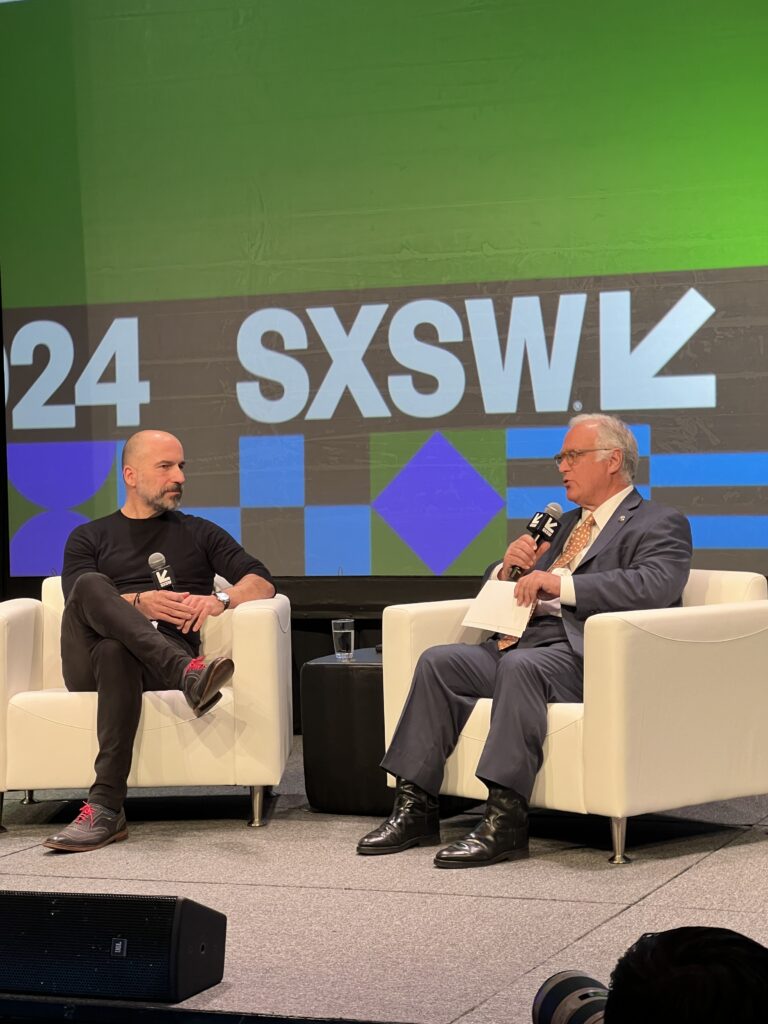
Ridesharing companies have had a difficult time historically in Austin.
In 2015, Uber and Lyft didn’t operate during South by Southwest because of regulatory hurdles.
Ridesharing companies shut down operations the following year after Austin voters passed a proposition requiring driver background checks. The companies appealed to the Texas legislature, and Austin’s Mayor Kirk Watson, who served in the Texas Senate then, voted against Uber.
“We’re in a different place now,” Watson said Monday morning at a featured session at SXSW: A Conversation with Uber CEO Dara Khosrowshahi.
Khosrowshahi said he wasn’t with Uber then, but looking back at what happened, he said Uber’s communication with local and state leaders could have been more collaborative.
Today, Austin is one of Uber’s top cities, Khosrowshahi said.
Watson said Austin embraces new people, ideas, and concepts. Its ethos is to keep Austin weird, which means keeping Austin open to new ideas, he said. The key is that disruptors must embrace communication and collaboration with city leaders and citizens, he said.
“As the new ideas come into play, people will need to make sure they focus on the values and that they communicate and collaborate,” Watson said.
In addition to traditional Uber rides, Uber offers micro-mobility choices through its app, Watson said.
Uber has a partnership with Lime that allows consumers to book an eScooter ride on the app. Khosrowshahi said Uber is about multi-modal transportation and giving consumers a choice. He said scooters are popular with people who must go less than three or two miles.
Watson said Austin wants every tool in the toolbox for transportation, including scooters. “People are voting with their feet.”
Watson said that in 2023, there were over 130,000 rides in just under 130,000 miles of travel in Austin. Most of the trips were around three-fourths of a mile.
Watson said Austin’s universities serve as a fountain of youth for the city, providing many young people who are focused on sustainability and want better transportation options.
Austin is compelling and aggressive in protecting the environment, Watson said.
Transportation is at the center of sustainability for the city, Watson said.
It’s evident that transportation is the hub of a multi-spoke wheel,” Watson said. “If we do transportation right, we do the environment right. If we do transportation right, we do affordability right.”
Watson said one of the biggest pushes for sustainability in the city is preserving Austin’s light rail system, Connect, which is under assault.
“It’s key to protecting the environment,” he said.
“Unfortunately, in Texas, the word Rail is a four-letter word,” Watson said.
Watson said that Austinites are asking for clean transit.
Khosrowshahi said Uber Green is a big part of its offerings. However, when it comes to paying a premium for a green offering, consumers believe it is an investment that the government and private industry should make.
Khosrowshahi said Uber will be emissions-free and all-electric in Europe by 2030 and worldwide by 2040. Uber has the largest fleet worldwide, with over 125,000 electric vehicles. Uber also invests over $800 million to fund drivers’ switch to EVs and is helping to build the charging infrastructure in cities. In Austin, he said, the penetration of EVs is almost 9 percent.
Watson said that with the growth of Austin, autonomous vehicle technology offers a lot of potential.
“I see a lot of promise in those vehicles, but we’re not there yet,” Watson said.
Watson has been in office for 14 months. He said that for the first six months, some autonomous vehicle group wanted to come in and meet with him to tell him how they would change the world. But autonomous vehicles present safety issues, he said.
“Safety is the number one issue,” he said.
Watson said autonomous vehicles were not responsive to emergency vehicles and were parked in the wrong places. Cruise recently halted its AV rides in Austin and nationwide after safety issues arose in California.
“Accessibility is also an issue,” Watson said.
Human drivers cause more than 35,000 fatalities on the road nationwide every year, Khosrowshahi said. So, should an AV be as safe as a human being or five or ten times safer? Khosrowshahi asked Watson.
Watson said he didn’t know. But he compared riding in the back of an AV to riding on a motorcycle. He was impressed with the vehicle’s operation and attention to potential road hazards.
Khosrowshahi said Uber doesn’t have its own AV technology but partners with others, and those partners want to be multiple times safer than human drivers.
Khosrowshahi said Uber is focused on affordability worldwide. It also wants to build an on-demand logistics Uber delivery network that will allow local businesses to deliver packages to consumers on the same day. He said Uber wants to empower every business to send packages. AVs will be part of that.

